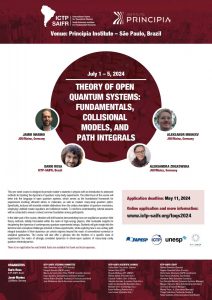Minicourse on open quantum systems: fundamentals, collisional models, and path integrals
July 1 – 5, 2024
São Paulo, Brazil
Venue: Principia Institute
Home
This one-week course is designed to provide master’s students in physics with an introduction to advanced methods for tackling the dynamics of quantum many-body experiments.
The initial focus of the course will delve into the language of open quantum systems, which serves as the foundational framework for experiments involving ultracold atoms or molecules, as well as modern many-body quantum optics. Specifically, lectures will elucidate notable distinctions from the unitary description of quantum mechanics, employing Lindblad master equations and collisional models. To reinforce understanding, tutorial sessions will be conducted to ensure a robust common foundation among participants.
In the latter part of the course, attention will shift towards demonstrating how non-equilibrium quantum field theory methods, initially formulated within the realm of high-energy physics, offer invaluable insights for deciphering the dynamics of contemporary quantum experimental setups. Students will gain insight into the technical and conceptual challenges inherent in these experiments, while exploring how a non-unitary path integral description of their dynamics can unlock regimes beyond the reach of conventional numerical or analytical approaches.
The course will also offer a glimpse into the frontiers of a specific class of experiments: the realm of strongly correlated dynamics in driven-open systems of many-body cavity quantum electrodynamics.
Pre-requisites: A postgraduate course on quantum mechanics.
There is no registration fee and limited funds are available for travel and local expenses.
Organizer:
- Dario Rosa (ICTP-SAIFR, Brazil)
- Jamir Marino (JGU/Mainz, Germany)
List of participants: Updated on July 09, 2024.
Survey: HERE
Lectures
Students should be familiar with:
Negele, Orland ‘Quantum many particle systems’ chapters 2.2, 5.1 and 5.2 and ‘density matrix in quantum mechanics’ (Sakurai, ch. 3.4)
- Jamir Marino (JGU/Mainz, Germany): Lindblad equation and Keldysh formalism
- Aleksandr Mikheev (JGU/Mainz, Germany): 2PI and the Dicke model
- Dario Rosa (ICTP-SAIFR, Brazil): Collisional models
- Aleksandra Ziolkowska (JGU/Mainz Germany): Introduction to 2PI
Registration
Program
Students should be familiar with:
Negele, Orland ‘Quantum many particle systems’ chapters 2.2, 5.1 and 5.2 and ‘density matrix in quantum mechanics’ (Sakurai, ch. 3.4)
Poster session
- Pedro Barreto Melo (PUC-Rio): Stochastic Thermodynamics of Fisher Information
- José Lukas Montenegro Ferreira (Universidade Federal da Paraíba): Shortcuts to adiabaticity designed via time-rescaling follow the same transitionless route
- Luis Eduardo Herrera (University of Delaware ): Cavity-mediated enhancement of the energy transfer in the reduced Fenna–Matthews–Olson complex
- Guilherme Rafael Ferreira dos Santos (Universidade do Estado do Rio de Janeiro (UERJ)): Semiclassical dynamics of electrons in open topological systems
- Mariana Teixeira Santos (Centro Brasileiro de Pesquisas Físicas (CBPF)): Master equations for generalized subsystems
- Matheus Monteiro Ramalho Poltronieri Martins (Centro brasileiro de Pesquisas Físicas): Purification of a continuously monitored qubit
- Mariano Uria Valencia (Universidad de Concepción): The Road to Non-Classical States
- Ruben Auccaise Estrada (Universidade Estadual de Ponta Grossa): Relaxation of a heteronuclear spin system via Redfield equation
Videos and Files
- 09:30 - Jamir Marino (JGU/Mainz, Germany): Lindblad equation - Class 1
- 11:00 - Jamir Marino (JGU/Mainz, Germany): Lindblad equation - Class 2
-
15:00 - Dario Rosa (ICTP-SAIFR, Brazil):
Collisional models - Class 1
-
16:30 - Dario Rosa (ICTP-SAIFR, Brazil):
Collisional models - Class 2
-
09:30 - Dario Rosa (ICTP-SAIFR, Brazil):
Collisional models - Class 3
-
11:00 - Dario Rosa (ICTP-SAIFR, Brazil):
Collisional models - Class 4
- 14:00 - Jamir Marino (JGU/Mainz, Germany): Lindblad equation - Class 3
- 15:30 - Jamir Marino (JGU/Mainz, Germany): Keldysh formalism - Class 1
- 09:30 - Jamir Marino (JGU/Mainz, Germany): Keldysh formalism - Class 2
- 11:00 - Jamir Marino (JGU/Mainz, Germany): Keldysh formalism - Class 3
-
09:30 - Aleksandra Ziolkowska (JGU/Mainz Germany):
Introduction to 2PI - Class 1
-
11:00 - Aleksandra Ziolkowska (JGU/Mainz Germany):
Introduction to 2PI - Class 2
-
14:00 - Aleksandra Ziolkowska (JGU/Mainz Germany):
Introduction to 2PI - Class 3
- 15:30 - Aleksandr Mikheev (JGU/Mainz, Germany): 2PI and the Dicke model - Class 1
- 09:30 - Aleksandr Mikheev (JGU/Mainz, Germany): 2PI and the Dicke model - Class 2
- 11:00 - Aleksandr Mikheev (JGU/Mainz, Germany): 2PI and the Dicke model - Class 3
- 14:00 - Aleksandr Mikheev (JGU/Mainz, Germany): 2PI and the Dicke model - Class 4
- 15:30 - Aleksandr Mikheev (JGU/Mainz, Germany): 2PI and the Dicke model - Class 5
asdasdasd
Photos
Additional Information
BOARDING PASS: All participants, whose travel has been provided or will be reimbursed by ICTP-SAIFR, should bring the boarding pass upon registration. The return boarding pass (PDF, if online check-in, scan or picture, if physical) should be sent to secretary@ictp-saifr.org by e-mail.
COVID-19: Brazilians and foreigners no longer have to present proof of vaccination before entering the country.
Visa information: Nationals from several countries in Latin America and Europe are exempt from tourist visa. Nationals from Australia, Canada and USA are exempt from tourist visa until April 10, 2025. Please check here which nationals need a tourist visa to enter Brazil.
Accommodation: Participants, whose accommodation will be provided by the institute, will stay at The Universe Flat. Hotel recommendations are available here.
How to reach the Principia Institute: The meeting will be held at Principia Institute of the Institute for Theoretical Physics Foundation, located at Rua Pamplona, 145.
Poster presentation: Participants who are presenting a poster MUST BRING A PRINTED BANNER . The banner size should be at most 1 m (width) x 1,5 m (length). We do not accept A4 or A3 paper.


